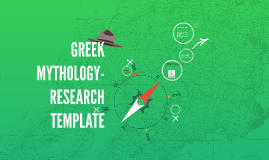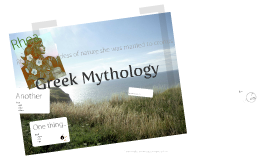Greek Mythology for Teenagers
Transcript: Mythology in Education Mythology is increasingly integrated into educational curricula, enriching students' understanding of literature and history. Engaging with Greek myths fosters analytical skills and appreciation for cultural heritage. Learning from Ancient Stories Impact of Greek Mythology Today Ancient stories serve as cautionary tales about human behavior. The narratives of Greek mythology provide frameworks for understanding ethics, resilience, and the human condition, offering valuable lessons for today. Hades: God of the Underworld Artemis: Goddess of the Hunt Artemis, the twin sister of Apollo, is the goddess of the hunt, wilderness, and childbirth. She represents independence and is often depicted with a bow and arrow, symbolizing her fierce connection to nature. Hades rules the underworld and oversees the dead, often misunderstood as a harsh ruler. Unlike typical depictions of evil, he is a necessary force in the cycle of life and death, maintaining balance in the universe. Birth of the Titans The Titans were born from Gaia and Uranus, representing primal powers of nature. Notable Titans like Cronus and Rhea led a lineage that would eventually clash with the Olympian gods in a legendary struggle for supremacy. Creation of Humans Inspired by the gods, humans were fashioned by Prometheus from clay, bringing life and consciousness. This act signified the connection between divine beings and humanity, emphasizing the importance of both in Greek mythology. Greek mythology continues to resonate across various aspects of modern life, influencing literature, pop culture, and education. Its timeless lessons and complex characters provide invaluable insights into human nature and interpersonal relationships. Continuing Relevance of Myths Influence in Literature Many literary works draw upon Greek mythology, using its themes and characters to convey complex ideas. Authors like Homer and Virgil embedded mythological references, shaping narratives that explore heroism, morality, and fate. Greek myths remain relevant as they address universal themes like love, vengeance, and the quest for knowledge. Their narratives resonate with modern audiences, often reflecting ongoing societal struggles and aspirations. Apollo: God of the Sun Emergence of the Universe Gaia and Uranus The Seven Most Popular Greek Gods Apollo embodies light, music, prophecy, and healing. As the god of the sun and the arts, he inspires creativity and is associated with the oracle at Delphi, where he conveyed messages from the divine. Gaia, the Earth, emerged from Chaos, representing fertility and life. She united with Uranus, the Sky, resulting in the creation of the Titans, a pivotal generation of powerful beings that would shape the future of mythology. After the initial chaos, order emerged through the separation of the earth, sky, and sea, creating a structured universe. This delineation paved the way for both human life and the advent of gods who governed various aspects of existence. Interdisciplinary Connections Lessons from Greek Myths Greek Myths in Pop Culture Greek mythology has influenced films, music, and video games, reflecting its cultural significance. Movies like 'Clash of the Titans' and video games like 'God of War' portray gods and heroes, enriching storytelling in pop culture. The Chaos The Role of the Elements Studying Greek mythology bridges disciplines such as history, literature, and art. Its interdisciplinary nature enhances understanding of ancient cultures and their impact on contemporary society, fostering critical thinking. Greek myths provide moral and ethical lessons on hubris, justice, and the consequences of one’s actions. Characters like Icarus illustrate the dangers of overreaching ambition, emphasizing timeless human truths. Creation of the World Greek mythology is rich with fascinating deities, each embodying different aspects of life and human experience. The most prominent gods played crucial roles in the myths and legends that shaped Greek culture and continue to influence us today. At the beginning of existence was Chaos, a vast emptiness, from which all creation erupted. This primordial void gave rise to the first entities, marking the beginning of time and the universe as we know it. The elements of earth, air, fire, and water were not just foundational to the world but were also personified in deities. These elements encapsulated various aspects of life, showcasing their critical importance in both myth and reality. Athena: Goddess of Wisdom Athena stands out as a goddess of wisdom, courage, and strategic warfare. Born from Zeus’s forehead, she symbolizes intellect and skill, often assisting heroes in their quests and representing reason and justice. The creation of the world in Greek mythology begins with Chaos, from which all things emerged, setting the stage for the birth of reality, including the Titans and gods. Numerous elements played vital roles in shaping both the cosmos and humanity,

















